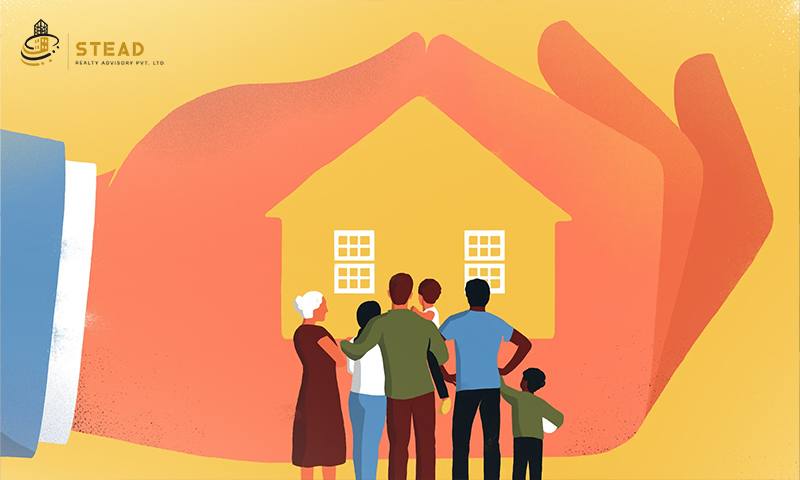Affordable Housing 101: Tips for Finding Your Budget-Friendly Home
Buying a house brings warmth, security and helps you create joyful memories with your loved ones. In addition, it’s one of the biggest investments you’ll ever make as properties appreciate in value over a period of time.
Using online real-estate portals, you can filter search results based on your needs and requirements. Be it budget-friendly home apartments or spacious bungalows; you can view houses within a specific range of prices, much-needed amenities, and locations from the comfort of your space. Also, many renowned builders use social media platforms to inform buyers about new offerings on new or upcoming projects.
Along with happiness, a new house brings a lot of expenses on its way. From property tax to society maintenance charges, you must be financially stable to pay these overheads on time. Hence, calculate and estimate the correct budget while buying a new home.
If you aren’t careful with your budget, there are higher chances that you will struggle to manage the expenses and end up making a wrong capital-investment decision.
Let’s delve into some tips and tricks to help you find budget-friendly homes that fit your pocket and give you maximum amenities. But before that, let’s understand the essential prerequisites you need before beginning your home-buying journey.
Requirements Before Searching For Budget-Friendly Homes?
Being familiar with the requirements you need to buy a home can simplify the process of buying a house. Take a look at all the basics you need to fulfill before commencing your search for a dream home.
- Healthy Credit Score
A credit score is crucial to determine the eligibility of a home loan amount. Your credit score is based upon:
- Your timely payment of EMIs, loans, and taxes.
- The total money you owe to banks or other financial institutions.
- The timeline of your credit history.
- Types of loans you have applied for.
The higher the score, the better the loan options available at lesser interest rates.
- Income & Employment Status
Ensure you are financially stable in terms of employment and other income sources. Before lending you a loan, financial institutions will always check your job profile, work history, and family background to ensure you will make the payment on time. Simultaneously, it helps you to be mentally prepared for taking the biggest decision of your life; because buying a house is a commitment.
- Debt-To-Income Ratio (DTI)
The Debt-To-Income ratio (DTI) is one of the crucial financial instruments a lender uses to access your loan applications. It enables the lenders to evaluate the mortgage amount they can provide you after determining your monthly income with debts. It is calculated by dividing the monthly debts by your gross monthly salary.
- Arrangement for Down Payments
It’s a one-time payment towards the buying of a home. Money lenders will ask you to pay a certain percentage of the total home value to process the loan applications. This mitigates the loss these lenders might suffer in the future and reassures them about your financial status.
Tips For Finding Budget-Friendly Houses
Following are some tips and tricks for finding budget-friendly home constructions:
- Look For Govt-Funded Housing Schemes
The Government of India has initiated many housing schemes for middle-class and lower-income Indian citizens. These schemes can provide you with some subsidiaries, offer lower-interest-rate loans, or avoid overhead costs on the property.
Check out some government housing schemes that assist you in buying a property in India:
- Pradhan Mantri Awas Yojana (PMAY)
The PMAY scheme provides affordable housing loans for Lower Income Groups (LIG), Economically Weaker Sections (EWS) and Middle-Income Groups (MIG). Based on the annual income of your household, you get an affordable interest subsidy of up to INR 2.67 lakhs on the home loan.
Women and senior citizens are given preference by the PMAY housing scheme. It’s mandatory that the family must consist of a husband, a wife, and unmarried children.
- The Maharashtra Housing & Area Development Authority Scheme (MHADA)
As the name suggests, MHADA provides affordable housing to a resident of Maharashtra with a valid domicile certificate. Also, you must be 18 years and above and have a PAN card with a regular income source.
The Maharashtra Housing & Area Development Authority (MHADA) housing scheme operates through a lottery system. You need to visit the official MHADA website, fill out the application form, and pay the registration fee for the lottery online. Depending on your financial records, you will be allotted homes.
- Buy Under-the-Construction Properties
Under-construction properties cost 10% to 30% less than ready-to-move-in properties; provided the location, builder, and type of property remain the same. Although the waiting period is longer, you get the latest state-of-the-art amenities and modernized infrastructure after possession. Also, most financial institutions ask you to pay EMI only after the project gets completed.
However, investing your money only in renowned builders’ projects is important. Before making a buying decision, check property-related information. The Maharashtra Real Estate Regulatory Authority (MahaRERA) has instructed every registered housing project to include QR Codes in their advertisements. It provides essential project-related information in detail.
- Purchase House in a Less-Developed Area
This option might work for you if you want to buy a house for staying purposes. Housing in rural or outlying areas is more affordable than those in urban cities. However, you might have to compromise on amenities, infrastructure, and connectivity.
You can visit an online housing portal, set your budget, and search for a less-developed area. In case you’re lucky, you might get a rent-to-own option. Based on your understanding with the owner, you can pay rent up to a certain time. After the rental period gets over, you can purchase the property at an agreed price.
Final Thoughts
Searching for a budget-friendly home can be quite a challenging task. An informed approach is imperative to mitigate potential risks while making a buying decision. Therefore, buyers must seek the guidance of professionals in the field, conduct extensive research, and exercise sound judgment in making a wise investment decision! Make a good choice for investment.
If you’re buying a home for the first time or need a housing consultation, contact us today. Our marketing experts will reach out to you.
FAQ
1. What is affordable housing?
Affordable housing refers to housing options that are reasonably priced and designed to be within the financial means of individuals and families with lower to moderate incomes. It aims to provide safe and decent living conditions while keeping costs manageable.
2. Why is affordable housing important?
Affordable housing is crucial to ensure that people from various income levels have access to suitable and stable housing. It promotes inclusive communities, reduces homelessness, and supports overall economic well-being by freeing up funds for other essential needs.
3. How do I determine if I qualify for affordable housing?
Qualification criteria for affordable housing can vary by location and housing program. Generally, it’s based on your income relative to the area’s median income. Eligibility is often determined by factors such as family size, income, and certain preferences (like veterans or the elderly).
4. What are some tips for finding affordable housing?
- Research Local Programs: Look into local government programs, non-profit organizations, and housing authorities that offer affordable housing options.
- Online Resources: Utilize online platforms, websites, and apps that list available affordable housing units in your area.
- Network: Connect with community organizations, social workers, and housing advocates who may have information on affordable housing opportunities.
- Be Flexible: Consider various housing types, locations, and sizes to increase your chances of finding an affordable home.
- Patience is Key: The search for affordable housing might take time, so be patient and persistent.
5. What documents are typically required during the application process?
Commonly required documents include proof of identity, proof of income (pay stubs, tax returns), rental history, references, and documentation of any special circumstances that might affect your eligibility.







